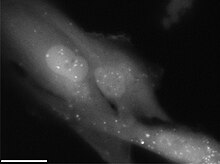User:Mr. Ibrahem/Acute radiation syndrome
| Acute radiation syndrome | |
|---|---|
| Other names | Radiation poisoning, radiation sickness, radiation toxicity |
 | |
| Radiation causes cellular degradation by autophagy. | |
| Specialty | Critical care medicine |
| Symptoms | Early: Nausea, vomiting, loss of appetite[1] Later: Infections, bleeding, dehydration, confusion[1] |
| Complications | Cancer[2] |
| Usual onset | Within days[1] |
| Types | Bone marrow syndrome, gastrointestinal syndrome, neurovascular syndrome[1][3] |
| Causes | Large amounts of ionizing radiation over a short period of time[1] |
| Diagnostic method | Based on history of exposure and symptoms[4] |
| Treatment | Supportive care (blood transfusions, antibiotics, colony stimulating factors, stem cell transplant)[3] |
| Prognosis | Depends on the exposure dose[4] |
| Frequency | Rare[3] |
Acute radiation syndrome (ARS), also known as radiation sickness or radiation poisoning, is a collection of health effects due to exposure to high amounts of ionizing radiation over a short period of time.[1] Symptoms can begin within an hour and may last for several months.[1][3][5] Symptoms within the first few days typically include nausea, vomiting, and loss of appetite.[1] This is followed by a few hours or weeks with little symptoms which later develops into additional symptoms followed by either recovery or death.[1]
Acute radiation syndrome involves a total dose of greater than 0.7 Gy (70 rads), that generally occurs from a source outside the body within minutes.[1] Sources of such radiation can occur accidentally or intentionally.[6] They may involve nuclear reactors, cyclotrons, and certain devices used in cancer therapy.[4] It is generally divided into three types; bone marrow, gastrointestinal, and neurovascular syndrome, with bone marrow syndrome occurring at 0.7 to 10 Gy, and neurovascular syndrome occurring at doses that exceed 50 Gy.[1][3] The cells that are most affected are generally those that are rapidly dividing.[3] At high doses, this causes DNA damage that may be irreparable.[4] Diagnosis is based on a history of exposure and symptoms.[4] Repeated complete blood counts (CBCs) can indicate the severity of exposure.[1]
Treatment of acute radiation syndrome is generally supportive care.[3] This may include blood transfusions, antibiotics, colony-stimulating factors, or stem cell transplant.[3] If radioactive material remains on the skin or in the stomach it should be removed.[4] If radioiodine was breathed in or ingested, potassium iodide may be recommended.[4] Complications such as leukemia and other cancers among those who survive are managed as usual.[4] Short term outcomes depend on the exposure dose.[4]
ARS is generally rare.[3] A single event, however, can affect a relatively large number of people.[7] Notable cases occurred following the atomic bombing of Hiroshima and Nagasaki and the Chernobyl nuclear power plant disaster.[1] ARS differs from chronic radiation syndrome, which occurs following prolonged exposures to relatively low doses of radiation.[8][9] In 2023 the World Health Organization updated its list of medicines for radiological and nuclear emergencies.[10]
References[edit]
- ^ a b c d e f g h i j k l m "A Fact Sheet for Physicians". CDC. CDC Radiation Emergencies Acute Radiation Syndrome. 22 April 2019. Archived from the original on 18 May 2019. Retrieved 17 May 2019.
- ^ "Beir VII: Health Risks from Exposure to Low Levels of Ionizing Radiation" (PDF). The National Academy. Archived (PDF) from the original on 2020-03-07. Retrieved 2020-07-26.
- ^ a b c d e f g h i Donnelly, EH; Nemhauser, JB; Smith, JM; Kazzi, ZN; Farfán, EB; Chang, AS; Naeem, SF (June 2010). "Acute radiation syndrome: assessment and management". Southern Medical Journal. 103 (6): 541–6. doi:10.1097/SMJ.0b013e3181ddd571. PMID 20710137. Archived from the original on 2019-06-26. Retrieved 2020-07-26.
- ^ a b c d e f g h i "Radiation Sickness". National Organization for Rare Disorders. Archived from the original on 12 August 2019. Retrieved 6 June 2019.
- ^ Xiao M, Whitnall MH (January 2009). "Pharmacological countermeasures for the acute radiation syndrome". Curr Mol Pharmacol. 2 (1): 122–133. doi:10.2174/1874467210902010122. PMID 20021452.
- ^ Chao, NJ (April 2007). "Accidental or intentional exposure to ionizing radiation: biodosimetry and treatment options". Experimental Hematology. 35 (4 Suppl 1): 24–7. doi:10.1016/j.exphem.2007.01.008. PMID 17379083.
- ^ Acosta, Robert; Warrington, Steven J. (2022). "Radiation Syndrome". StatPearls. StatPearls Publishing. Archived from the original on 9 January 2020. Retrieved 12 October 2022.
- ^ Akleyev, Alexander V. (2014). "chronic%20radiation%20syndrome"&pg=PA1 Chronic Radiation Syndrome. Springer Science & Business Media. p. 1. ISBN 9783642451171. Archived from the original on 2021-08-27. Retrieved 2022-03-15.
- ^ Gusev, Igor; Guskova, Angelina; Mettler, Fred A. (2001). Medical Management of Radiation Accidents. CRC Press. p. 18. ISBN 9781420037197. Archived from the original on 2021-08-27. Retrieved 2020-07-26.
- ^ "WHO updates critical medicines list for radiological and nuclear emergencies". www.who.int. Archived from the original on 27 January 2023. Retrieved 27 January 2023.
